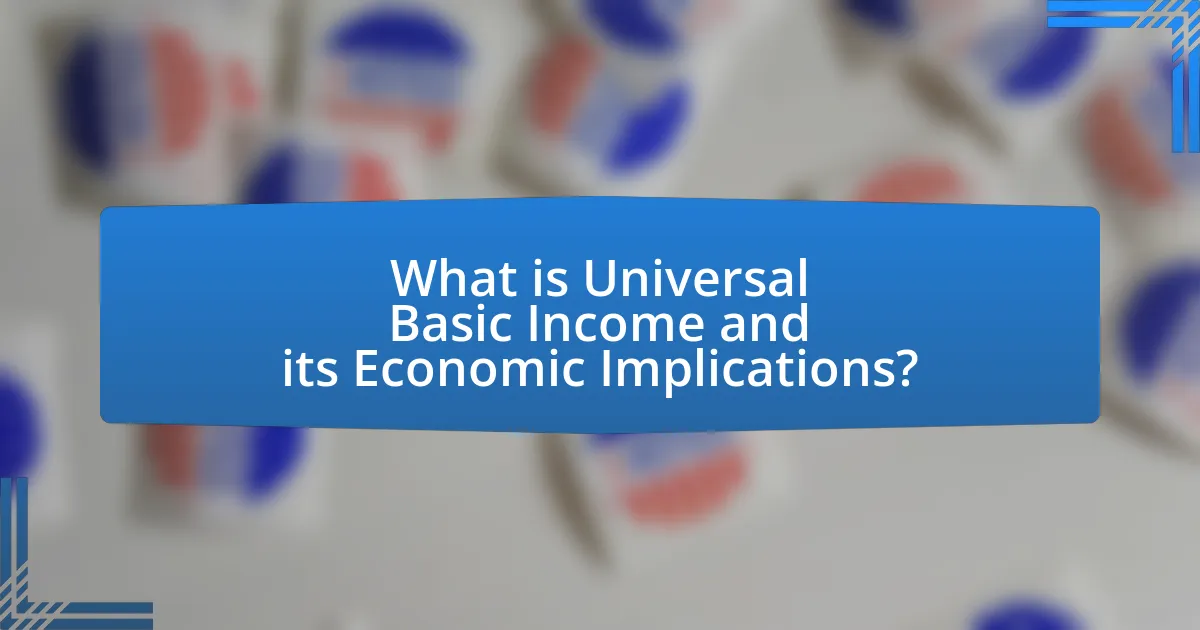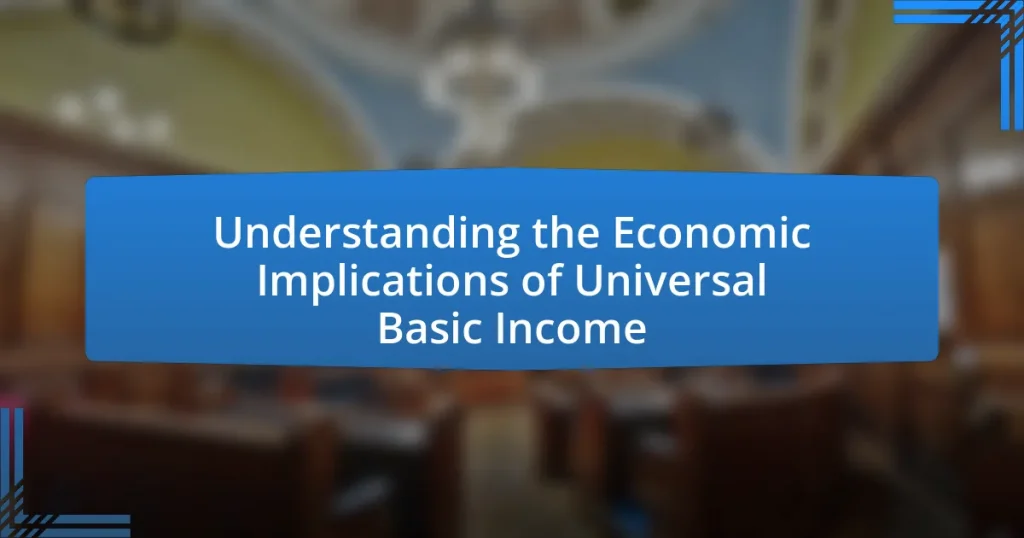Universal Basic Income (UBI) is a financial policy that provides all citizens with a regular, unconditional sum of money, aiming to reduce poverty and inequality while stimulating economic growth. The article explores the economic implications of UBI, including its potential to increase consumer spending, simplify welfare systems, and enhance overall well-being. It also addresses the key components of UBI, its differences from traditional welfare systems, potential benefits, challenges, and criticisms, as well as its impact on labor market participation and inflation rates. Additionally, the article examines lessons learned from pilot programs and outlines practical steps for effective implementation of UBI.

What is Universal Basic Income and its Economic Implications?
Universal Basic Income (UBI) is a financial policy that provides all citizens with a regular, unconditional sum of money, regardless of other income. The economic implications of UBI include potential reductions in poverty and inequality, as it ensures a basic standard of living for everyone. Studies, such as the one conducted by the Roosevelt Institute, suggest that implementing UBI could stimulate economic growth by increasing consumer spending, as individuals have more disposable income. Additionally, UBI may reduce the need for complex welfare systems, potentially lowering administrative costs. However, critics argue that UBI could lead to inflation and disincentivize work, impacting labor markets.
How does Universal Basic Income function within an economy?
Universal Basic Income (UBI) functions within an economy by providing all citizens with a regular, unconditional sum of money, which aims to reduce poverty and inequality. This financial support allows individuals to meet basic needs, thereby increasing overall consumer spending, which can stimulate economic growth. For instance, a study by the Roosevelt Institute found that implementing a UBI of $1,000 per month could increase GDP by 12.56% over eight years due to increased consumer spending. Additionally, UBI can reduce the administrative costs associated with welfare programs, as it simplifies the distribution of financial aid. By ensuring a basic income, UBI also encourages entrepreneurship and job flexibility, as individuals may pursue education or start businesses without the immediate pressure of financial insecurity.
What are the key components of Universal Basic Income?
The key components of Universal Basic Income (UBI) include unconditional cash payments, regular disbursement, and universality. Unconditional cash payments mean that individuals receive money without any requirements or conditions, ensuring financial support for all. Regular disbursement refers to the consistent frequency of payments, typically monthly, providing a stable income source. Universality indicates that UBI is provided to all citizens, regardless of income level or employment status, promoting equality and reducing poverty. These components are designed to enhance economic security and stimulate consumer spending, as evidenced by pilot programs in various countries showing positive impacts on well-being and economic activity.
How does Universal Basic Income differ from traditional welfare systems?
Universal Basic Income (UBI) differs from traditional welfare systems primarily in its unconditional nature and universal coverage. UBI provides a regular, fixed payment to all individuals regardless of their income level or employment status, whereas traditional welfare systems often require means-testing and are contingent upon specific eligibility criteria, such as income thresholds or family circumstances. For instance, UBI aims to eliminate poverty and reduce inequality by ensuring a basic financial floor for everyone, while traditional welfare programs may only assist those who meet certain conditions, potentially leaving some vulnerable populations without support. This fundamental difference in approach highlights UBI’s potential to simplify social safety nets and promote economic stability.
What are the potential benefits of implementing Universal Basic Income?
Implementing Universal Basic Income (UBI) can lead to reduced poverty levels and increased economic stability. By providing a guaranteed income to all individuals, UBI can alleviate financial stress, allowing people to meet basic needs such as food, housing, and healthcare. Studies, such as the one conducted in Finland from 2017 to 2018, showed that participants in a UBI trial reported improved well-being and mental health, indicating that financial security can enhance overall quality of life. Additionally, UBI can stimulate local economies, as individuals are likely to spend their income on goods and services, thereby supporting businesses and creating jobs. Research from the Economic Security Project highlights that UBI can also encourage entrepreneurship, as individuals may feel more secure in taking risks to start new ventures.
How could Universal Basic Income reduce poverty levels?
Universal Basic Income (UBI) could reduce poverty levels by providing a guaranteed financial support system that ensures all individuals receive a regular, unconditional sum of money. This financial security enables individuals to meet basic needs such as food, housing, and healthcare, thereby alleviating immediate economic stress. Research conducted by the Roosevelt Institute indicates that implementing UBI could increase GDP by 12.56% over eight years, demonstrating its potential to stimulate economic growth and reduce poverty rates. Additionally, pilot programs in countries like Finland and Canada have shown that UBI recipients experience improved mental health and increased employment opportunities, further contributing to poverty reduction.
What impact might Universal Basic Income have on consumer spending?
Universal Basic Income (UBI) is likely to increase consumer spending by providing individuals with a guaranteed income, which enhances their purchasing power. Research indicates that when people receive UBI, they tend to spend a significant portion of it on essential goods and services, thereby stimulating local economies. For instance, a study conducted in Finland during its UBI trial found that recipients reported higher levels of financial security and increased spending on health, education, and leisure activities. This behavior suggests that UBI can lead to a multiplier effect in the economy, where increased consumer spending drives demand and potentially boosts economic growth.
What challenges and criticisms surround Universal Basic Income?
Universal Basic Income (UBI) faces several challenges and criticisms, primarily concerning its economic feasibility, potential disincentives to work, and the impact on inflation. Critics argue that funding UBI could require significant tax increases or reallocating funds from existing welfare programs, which may not be politically viable. Additionally, there are concerns that providing a guaranteed income might reduce the incentive for individuals to seek employment, potentially leading to a decrease in the labor force participation rate. Studies, such as those conducted in Finland, indicate mixed results regarding work incentives, with some participants reducing their working hours. Furthermore, opponents warn that a large influx of cash into the economy could lead to inflationary pressures, diminishing the purchasing power of the UBI itself. These challenges highlight the complexities of implementing UBI as a sustainable economic policy.
Why do some economists oppose Universal Basic Income?
Some economists oppose Universal Basic Income (UBI) due to concerns about its potential impact on labor supply and inflation. Critics argue that providing a guaranteed income may disincentivize work, leading to a reduction in labor force participation. For instance, a study by the National Bureau of Economic Research found that cash transfer programs can decrease employment among recipients. Additionally, opponents worry that UBI could lead to inflationary pressures, as increased disposable income may drive up prices for goods and services. This concern is supported by historical examples, such as the inflation experienced in various countries after implementing large-scale welfare programs.
How could Universal Basic Income affect labor market participation?
Universal Basic Income (UBI) could increase labor market participation by providing individuals with financial security, allowing them to pursue employment opportunities that align with their skills and interests rather than being forced into jobs solely for survival. Research from the Economic Security Project indicates that UBI can reduce the stress associated with financial instability, enabling people to take risks such as starting a business or seeking further education, which can ultimately lead to higher overall employment rates. Additionally, studies, such as those conducted in Finland during its UBI trial, showed that recipients reported higher levels of well-being and were more likely to engage in job-seeking activities compared to non-recipients.
How does Universal Basic Income relate to current economic trends?
Universal Basic Income (UBI) is increasingly relevant to current economic trends as it addresses rising income inequality and job displacement due to automation. Economic studies indicate that UBI can provide a safety net for individuals affected by these trends, promoting consumer spending and economic stability. For instance, a 2020 report by the Roosevelt Institute found that implementing a UBI of $1,000 per month could increase GDP by 12.56% over eight years, demonstrating its potential to stimulate economic growth in a changing labor market.
What lessons can be learned from pilot programs of Universal Basic Income?
Pilot programs of Universal Basic Income (UBI) demonstrate that providing a guaranteed income can reduce poverty and improve overall well-being. For instance, the UBI pilot in Finland showed that recipients reported higher levels of life satisfaction and mental health compared to non-recipients. Additionally, the Stockton Economic Empowerment Demonstration in California revealed that participants used the funds primarily for essential needs, such as food and housing, which contributed to economic stability. These programs also indicated that UBI could encourage entrepreneurship, as individuals felt more secure in taking risks without the fear of financial ruin. Overall, pilot programs suggest that UBI can have positive social and economic effects, including enhanced quality of life and increased financial security.
What are the long-term economic implications of Universal Basic Income?
The long-term economic implications of Universal Basic Income (UBI) include potential increases in consumer spending, reductions in poverty rates, and shifts in labor market dynamics. UBI provides individuals with a guaranteed income, which can stimulate demand for goods and services, leading to economic growth. For instance, studies such as the one conducted in Finland from 2017 to 2018 showed that recipients of UBI reported improved well-being and increased spending, which can drive local economies.
Additionally, UBI may reduce poverty and inequality by providing a safety net for those in precarious employment or unable to work. Research from the Economic Security Project indicates that UBI can lift families above the poverty line, thereby decreasing reliance on social welfare programs.
Moreover, UBI could alter labor market behavior by allowing individuals to pursue education or entrepreneurial ventures without the immediate pressure of financial insecurity. A study by the Roosevelt Institute suggests that implementing UBI could lead to a more innovative workforce, as individuals may take risks in starting new businesses or pursuing creative endeavors.
Overall, the long-term economic implications of UBI encompass enhanced consumer spending, reduced poverty, and transformative effects on the labor market, supported by empirical research and case studies.
How might Universal Basic Income influence inflation rates?
Universal Basic Income (UBI) may lead to increased inflation rates due to heightened consumer spending. When individuals receive a guaranteed income, they typically have more disposable income, which can boost demand for goods and services. This increased demand can outpace supply, resulting in price increases. For instance, a study by the Roosevelt Institute found that a UBI of $1,000 per month could increase GDP by 12.56% over eight years, but it also suggested potential inflationary pressures as demand rises. Thus, while UBI aims to alleviate poverty, its implementation could create inflationary effects in the economy.
What effects could Universal Basic Income have on income inequality?
Universal Basic Income (UBI) could significantly reduce income inequality by providing a guaranteed financial floor for all individuals, thereby increasing the income of the lowest earners. Research indicates that UBI can lift people above the poverty line, as evidenced by pilot programs like the one in Finland, where participants reported improved well-being and financial security. Additionally, studies show that UBI can stimulate local economies by increasing consumer spending, which benefits businesses and creates jobs, further contributing to a more equitable income distribution.
What practical steps can be taken to implement Universal Basic Income effectively?
To implement Universal Basic Income (UBI) effectively, governments should establish a clear funding mechanism, such as reallocating existing welfare budgets or introducing new taxes, like a wealth tax or carbon tax. This funding strategy is crucial as it ensures the sustainability of UBI payments. For instance, the city of Stockton, California, successfully funded its UBI pilot program by reallocating funds from its budget, demonstrating a practical approach to financing UBI.
Next, governments must define the payment amount and frequency, ensuring it meets basic living standards. Research indicates that a monthly payment of around $1,000 can significantly reduce poverty levels, as evidenced by the Alaska Permanent Fund, which has provided annual dividends to residents since 1982, contributing to lower poverty rates in the state.
Additionally, implementing a robust administrative framework is essential for efficient distribution. Utilizing existing social service infrastructures can streamline the process, as seen in Finland’s UBI trial, which leveraged existing welfare systems to distribute payments effectively.
Finally, conducting pilot programs can provide valuable data on UBI’s impacts, allowing for adjustments before full-scale implementation. The results from various trials, such as those in Canada and Finland, offer insights into UBI’s effects on employment, health, and well-being, guiding policymakers in refining the approach.

